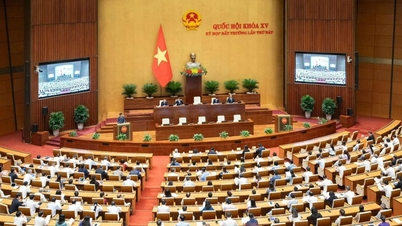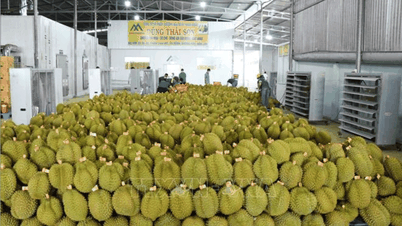Monetary policy needs to be more multi-targeted, with a focus on monetary and financial stability, shifting from a tight, cautious stance to “cautious easing, supporting growth”. Deputy Governor of the State Bank of Vietnam (SBV) Pham Thanh Ha discussed this issue with the press.
 |
| In the first five months of the year, 88,000 businesses withdrew from the market in Vietnam, up 22.6% over the same period last year. The business community is facing extreme difficulties. Photo: Hong Dat/VNA |
In the context of the economy facing the risk of recession, weak capital absorption... according to experts, ensuring multiple goals of supporting GDP growth of 6.5%, but having to control inflation at around 4.5%, ensuring system safety... creates a big challenge for the executive agency, especially in the context of limited monetary policy space. What is the State Bank's view on this issue, Deputy Governor?
In the context of a complex and unpredictable international environment, as a small economy with great openness like Vietnam, there are still many internal difficulties and challenges in monetary policy management.
In particular, the tools for managing interest rates, exchange rates, and credit face many challenges, and how to harmonize many conflicting goals such as supporting economic recovery after the pandemic while ensuring inflation control in the context of high and persistent global prices and inflation despite the fact that countries have fought inflation very strongly; ensuring the value of the Vietnamese Dong in the context of complex fluctuations in many currencies in the world while still having to reduce interest rates; ensuring the safety of the banking system while still ensuring credit needs for the economy, continuing to provide support solutions, and removing difficulties for customers borrowing capital...
The difficulties of the economy are general difficulties, in which we can distinguish between the difficulties of enterprises and the difficulties of banks. If banks support enterprises at an acceptable level, the economy will improve. If banks postpone, extend debt, or loosen credit conditions, the difficulties will shift to the banks, causing risks of system insecurity. The difficult problem here is that the State Bank must find a harmonious point that still supports the economy but still ensures the safety of the banking system. In particular, in operating monetary policy, "trial and error" is not allowed. Therefore, in operating monetary policy, it is necessary to aim at balancing the goals of stabilizing the macro economy, controlling inflation, stabilizing the money market, and aiming at the common long-term goal of stabilizing the banking system.
 |
| Deputy Governor of the State Bank Pham Thanh Ha. |
Deputy Governor, please tell us how the difficulties and challenges from outside and inside the country have affected the monetary policy management in the first 5 months of the year and how the State Bank has resolved that pressure with tools and solutions?
In the first months of 2023, many countries continue to face the risk of economic recession with high inflation. High inflation makes the trend of tightening monetary policy inevitable. Specifically: The Federal Reserve (FED) has raised interest rates at the fastest frequency and speed in history, 10 consecutive times, increasing by 5% within 14 months; global trade declines, crises at some banks in the US and Europe continue to pose challenges to monetary policy management worldwide.
Domestically, the economy is also facing many difficulties. The number of businesses withdrawing from the market is increasing. According to data from the first 4 months of 2023, the number of businesses withdrawing from the market was 77,000, an increase of 25.1% over the same period last year. Business conditions continued to narrow as the Vietnam Manufacturing Purchasing Managers' Index (PMI) fell back from 47.7 points in March 2023 to 46.7 points in April 2023, marking the 5th month below 50 in the past 6 months.
In the context of a complex and unpredictable international environment, as a small economy with a very large openness like Vietnam, there are still many internal difficulties, posing many challenges in the management of monetary policy. However, with the close direction of the Government and the Prime Minister , the banking sector has been proactive, flexible, and quickly adapted to the situation in managing monetary policy and banking activities.
Specifically, the SBV flexibly operates open market operations to stabilize the monetary market. Accordingly, the SBV maintains sessions to buy valuable papers with volumes and terms consistent with the objectives of monetary policy management, ensuring liquidity for credit institutions, and stabilizing the monetary market. At the same time, the SBV has adjusted the operating interest rate three times to remove difficulties for the economy, businesses, and people.
Based on the economic growth target of about 6.5% and inflation of about 4.5% in 2023 set by the National Assembly and the Government, the State Bank of Vietnam targets credit growth of about 14-15% in 2023, with appropriate adjustments based on actual developments and situations, contributing to stabilizing the macro economy and supporting reasonable economic growth.
Accordingly, the State Bank of Vietnam will manage the growth of credit volume and structure reasonably, meeting the credit capital demand of the economy to contribute to controlling inflation and supporting economic growth; direct credit institutions to increase credit growth throughout the year at a reasonable rate, directing credit to production and business sectors, priority sectors and economic growth drivers according to the Government's policy; ensure safe and effective credit activities, creating favorable conditions for businesses and people to access bank credit capital.
The State Bank of Vietnam has implemented many synchronous measures to strive to reduce lending interest rates to remove difficulties for businesses and people in accordance with the direction of the National Assembly and the Government in Resolution 43 and Resolution 11, such as encouraging credit institutions to reduce costs to stabilize lending interest rates to support businesses to recover and develop production and business.
The State Bank of Vietnam has worked with commercial banks to propose continuing to reduce interest rates to support businesses and the economy to recover production and business in February 2023 and May 2023. Accordingly, credit institutions have been taking measures to reduce lending interest rates to support businesses, people and the economy to recover production and business.
Based on the management and direction of the State Bank, up to now, the interest rate level has basically stabilized, and newly arising interest rates have tended to decrease gradually in the first month of 2023. The average newly arising deposit interest rate of commercial banks is at about 6.1%/year (down 0.37%/year compared to the end of 2022); the average newly arising VND lending interest rate of commercial banks is at about 9.07%/year (down 0.9%/year compared to the end of 2022).
In the coming time, the State Bank will continue to closely monitor domestic and international currency developments, forecast inflation and market interest rates to manage interest rates in line with macroeconomic balance, inflation and monetary policy targets. The State Bank will continue to have solutions to encourage credit institutions to reduce costs to reduce lending interest rates to support businesses to recover and develop production and business.
Could you please tell us about the policy direction from now until the end of the year so that monetary policy remains steady in the face of "headwinds" that may continue to occur in 2023, continuing to support economic growth and stabilize the macro economy?
The remaining months of 2023 are forecasted to continue to face many challenges in monetary policy management due to complicated developments in both the world and domestic economies. The world economy is expected to grow slowly with many uncertainties, inflation, although showing signs of peaking, continues to remain high in many countries, many central banks (CBs) still maintain high interest rate policies, and world commodity prices are at risk of strong fluctuations. Meanwhile, domestic economic growth is also facing increasing risks as declining world demand negatively impacts the processing and manufacturing industries, inflationary pressures remain, and investment and consumption activities also face many difficulties.
Accordingly, the State Bank continues to closely monitor domestic and foreign economic and monetary developments, and firmly, proactively and flexibly manage monetary policy instruments to contribute to controlling inflation, supporting economic growth, and stabilizing the money and foreign exchange markets. Specifically:
Firstly, operate open market operations flexibly and proactively, ready to support liquidity for the credit institution system. Recapitalize credit institutions to support liquidity, lend to programs approved by the Government and the Prime Minister, support the process of restructuring credit institutions and handling bad debts; Operate compulsory reserve tools in accordance with economic and monetary developments, and other monetary policy management measures to implement monetary policy objectives.
Second, interest rates must be managed in line with macroeconomic balance, inflation and monetary policy targets; credit institutions must continue to be encouraged to cut costs and reduce lending interest rates to support businesses in recovering and developing production and business.
Third, manage exchange rates in accordance with market conditions, intervene in the market when necessary, and synchronously coordinate monetary policy measures and tools to stabilize the foreign exchange market, contributing to controlling inflation and stabilizing the macro economy.
Fourth, continue to manage credit growth according to the target of 14-15% for the whole year of 2023; direct credit institutions to direct credit to production and business sectors, priority sectors and economic growth drivers according to the Government's policy, strictly control credit in potentially risky sectors; create favorable conditions for businesses and people to access bank credit capital.
Thank you very much, Deputy Governor!
( According to https://baotintuc.vn/kinh-te/ngan-hang-nha-nuoc-noi-gi-ve-de-xuat-noi-long-than-trong-chinh-sach-tien-te-20230529162136250.htm )
.
Source link




![[Photo] Vietnamese and Hungarian leaders attend the opening of the exhibition by photographer Bozoky Dezso](https://vphoto.vietnam.vn/thumb/1200x675/vietnam/resource/IMAGE/2025/5/29/94d8ceca5db14af3bf31285551ae4bb3)
![[Photo] Prime Minister Pham Minh Chinh meets with Hungarian President Sulyok Tamas](https://vphoto.vietnam.vn/thumb/1200x675/vietnam/resource/IMAGE/2025/5/29/dbcaa73e92ea4448a03fe1d0de6d68e8)

























![[Photo] Prime Minister Pham Minh Chinh receives a bipartisan delegation of US House of Representatives](https://vphoto.vietnam.vn/thumb/1200x675/vietnam/resource/IMAGE/2025/5/28/468e61546b664d3f98dc75f6a3c2c880)































































Comment (0)